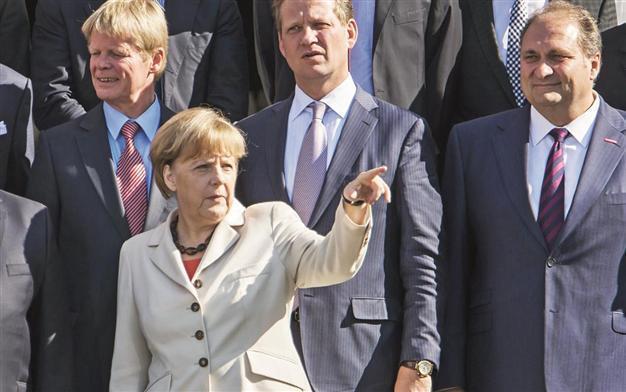No regrets from Germany for spying claims
Tolga Tanış BERLIN

Germany has shown no sign of regret over the electronic spying claims.
Germany shows no sign of regret over the electronic spying claims, with a senior German official saying it would not be surprising if they learn that Germany is also being spied on by the Turkish government in a similar way.The senior German politician, who is also a member of the cabinet, did not comment on the countries included in the Mission Statement of countries that should be monitored closely, but added that he would not be surprised if Germany is also on the Turkish government’s equivalent document.
The official, who wanted to remain anonymous due to the sensitivity of the issue, did not respond to the question of whether the Germany will apologize to Turkey about the claims, simply saying that “the German government is against neither Turkey nor Turkish immigrants.”
When reminded that Germany reacted harshly after the revelation that the U.S. had attempted to spy on German Chancellor Angela Merkel, the official said the two cases were “different,” which may be seen as another sign that Germany plans no apology to Turkey.
“The NSA scandal was a different case. There had been strong spying allegations. A suspect had been arrested. The Chancellor was targeted personally and her personal phone calls were intercepted,” he said.
The source denied that it would “hypocritical” for Germany to spy on Turkey, which it regards as an ally.
“We are not hypocritical. We have a lot of friends in the region such as Turkey and Israel … But the U.S., France and the U.K. are different since they are not only democratic countries, but also the ones that protected us after the Second World War against the Soviet imperialism. Our American friends also knew this. That is why we were very disappointed when we learned that the U.S. intercepted the personal phone calls of Chancellor Merkel, while also having an agent in the BND [German national intelligence agency],” the source said.
Daily Hürriyet has learned that Turkey was included on Germany’s Mission Statement in 1976 by a Social Democrat government led by Helmut Schmidt, soon after worker immigration from Turkey to Germany accelerated in the early 1970s. In 2004, another Social Democrat government in power under Gerhard Schröder modified the Mission Statement after 9/11, giving Turkey higher priority among the countries that are on the secret document.
“Chancellor Merkel came into office in 2005 and during her time in power the Mission Statement has been modified only once. Turkey was not among the countries whose status changed when this modification was made in 2009,” the German official told Hürriyet.
He also stressed that there was no “ideological motive” behind the spying claims.
“There is not any ideological motivation in this matter. The people should not think that a Christian Democrat [CDU] government in Germany targeted Turkey, because it is not true. The CDU did not make a decision about the status of Turkey,” the source said, expressing confidence that relations between the two countries would not be damaged by the claims.
“I don’t think this incident will hurt our bilateral relations. We will work to prevent any negative result of this incident on bilateral relations,” he also said, adding that the fight against terrorism was a common reason behind the cooperation.
“Germany and Turkey have been working on intelligence matters for a long period of time. Due to the common interests that we have had, the cooperation between the two countries on intelligence is very good. The basic reason for the intelligence cooperation with Turkey is combatting international terrorism. The citizens of the other countries travelling to Afghanistan and Pakistan through Turkey to engage in holy war were the focus of this cooperation. [The outlawed Kurdistan Workers’ Party] PKK terrorism was also one of the common concerns we have. There are 500-800,000 Kurdish-origin people living in Germany, and some are supporters of the PKK. Turkey and Germany have been working together to deal with this problem. The good thing is that both parties are aware of the common interests in working together in these areas,” he said.
“Syria is still unstable. We will have an assessment in the coming months on the German Patriot batteries deployed in Turkey to protect a NATO country from a missile threat. Some remarks of President Bashar al-Assad indicate that his attitude toward the Western countries has changed. But we will see. We have officially denied the press reports suggesting we made contact with the al-Assad regime. We need to talk about this issue with our partners,” the source added.
According to the official, a no-spy agreement with Turkey was on the table last year, but the process was not finalized. Such an agreement would not be under consideration now, but might be in the future, he added.
















